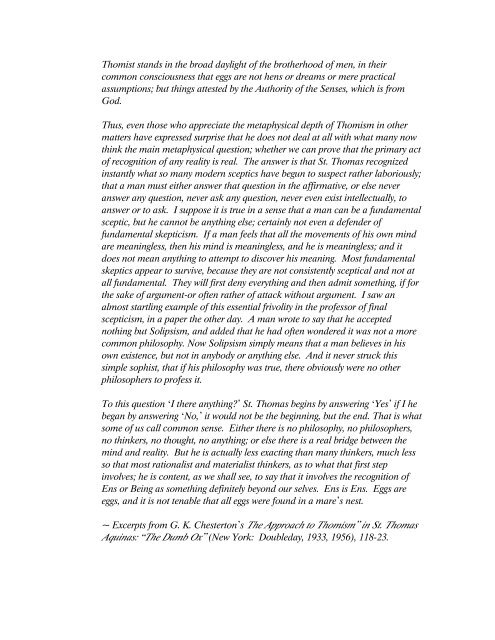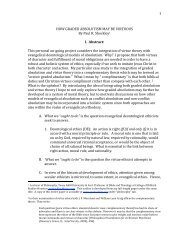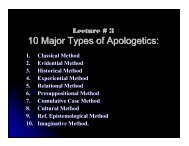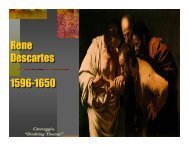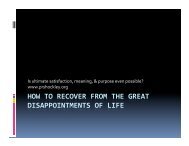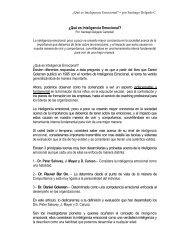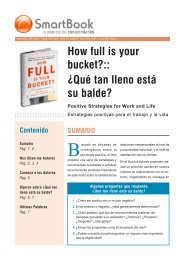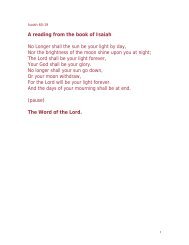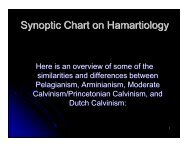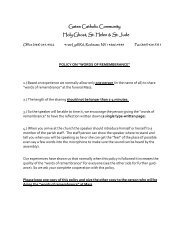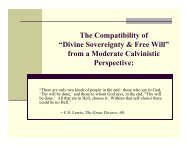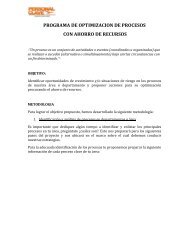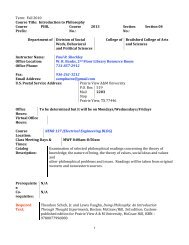Criticism of Modern Philosophy by G K Chesterton
Criticism of Modern Philosophy by G K Chesterton
Criticism of Modern Philosophy by G K Chesterton
You also want an ePaper? Increase the reach of your titles
YUMPU automatically turns print PDFs into web optimized ePapers that Google loves.
Thomist stands in the broad daylight <strong>of</strong> the brotherhood <strong>of</strong> men, in theircommon consciousness that eggs are not hens or dreams or mere practicalassumptions; but things attested <strong>by</strong> the Authority <strong>of</strong> the Senses, which is fromGod.Thus, even those who appreciate the metaphysical depth <strong>of</strong> Thomism in othermatters have expressed surprise that he does not deal at all with what many nowthink the main metaphysical question; whether we can prove that the primary act<strong>of</strong> recognition <strong>of</strong> any reality is real. The answer is that St. Thomas recognizedinstantly what so many modern sceptics have begun to suspect rather laboriously;that a man must either answer that question in the affirmative, or else neveranswer any question, never ask any question, never even exist intellectually, toanswer or to ask. I suppose it is true in a sense that a man can be a fundamentalsceptic, but he cannot be anything else; certainly not even a defender <strong>of</strong>fundamental skepticism. If a man feels that all the movements <strong>of</strong> his own mindare meaningless, then his mind is meaningless, and he is meaningless; and itdoes not mean anything to attempt to discover his meaning. Most fundamentalskeptics appear to survive, because they are not consistently sceptical and not atall fundamental. They will first deny everything and then admit something, if forthe sake <strong>of</strong> argument-or <strong>of</strong>ten rather <strong>of</strong> attack without argument. I saw analmost startling example <strong>of</strong> this essential frivolity in the pr<strong>of</strong>essor <strong>of</strong> finalscepticism, in a paper the other day. A man wrote to say that he acceptednothing but Solipsism, and added that he had <strong>of</strong>ten wondered it was not a morecommon philosophy. Now Solipsism simply means that a man believes in hisown existence, but not in anybody or anything else. And it never struck thissimple sophist, that if his philosophy was true, there obviously were no otherphilosophers to pr<strong>of</strong>ess it.To this question ‘I there anything?’ St. Thomas begins <strong>by</strong> answering ‘Yes’ if I hebegan <strong>by</strong> answering ‘No,’ it would not be the beginning, but the end. That is whatsome <strong>of</strong> us call common sense. Either there is no philosophy, no philosophers,no thinkers, no thought, no anything; or else there is a real bridge between themind and reality. But he is actually less exacting than many thinkers, much lessso that most rationalist and materialist thinkers, as to what that first stepinvolves; he is content, as we shall see, to say that it involves the recognition <strong>of</strong>Ens or Being as something definitely beyond our selves. Ens is Ens. Eggs areeggs, and it is not tenable that all eggs were found in a mare’s nest.~ Excerpts from G. K. <strong>Chesterton</strong>’s The Approach to Thomism” in St. ThomasAquinas: “The Dumb Ox” (New York: Doubleday, 1933, 1956), 118-23.


